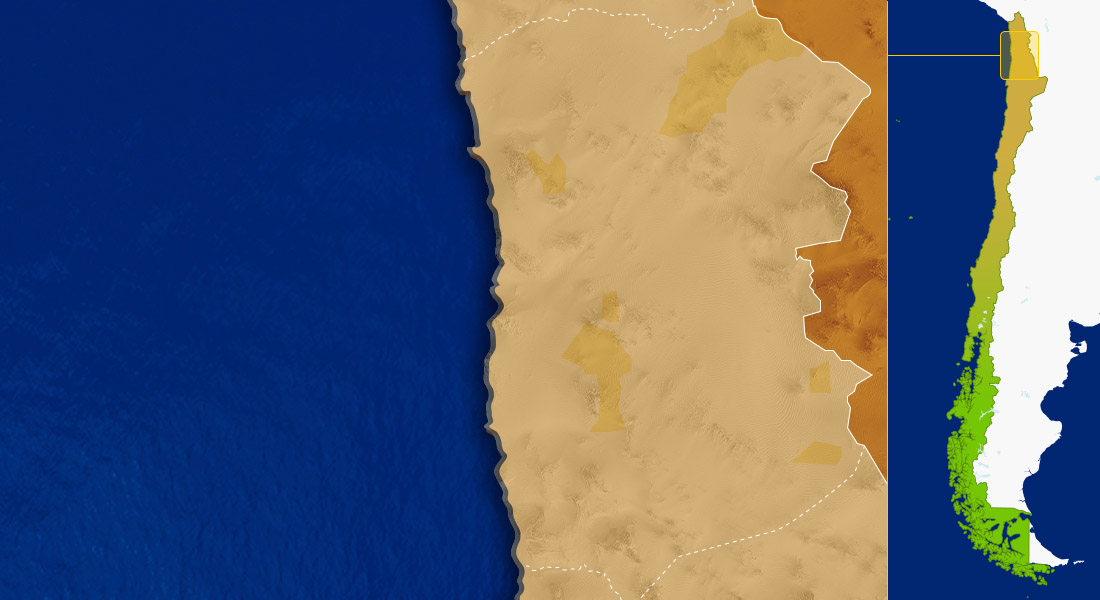SQM Present in the communities
Our operations are located in northern Chile in the Tarapacá and Antofagasta regions, which feature a predominately dry desert climate. Most of the population lives in the regional capital cities, outside of which the remaining population lives in towns or villages located at long distances from each other, connected by roads as ground travel is the main form of transportation.
There are small villages located near the Company’s operations that make their living from either farming, tourism, port operations or mining, such as María Elena, formerly a saltpeter town that is now known for providing services to the mining industry and as a future hub for niche tourism. There are also a considerable number of settlements of different Atacameña indigenous communities, particularly in the municipality of San Pedro de Atacama.
Because of our location, we interact with communities and nearby villages that are associated with our centers of production.
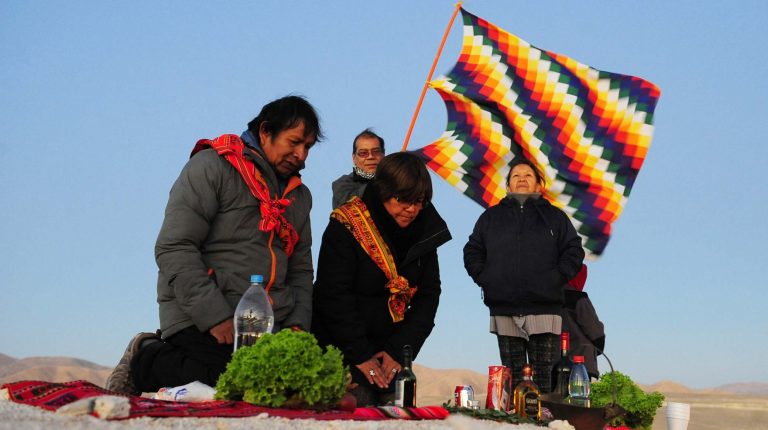
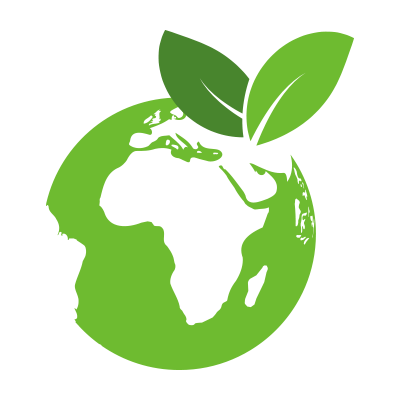
SQM-driven programs are implemented jointly with our neighbors with whom we have direct, trust-based relationships.
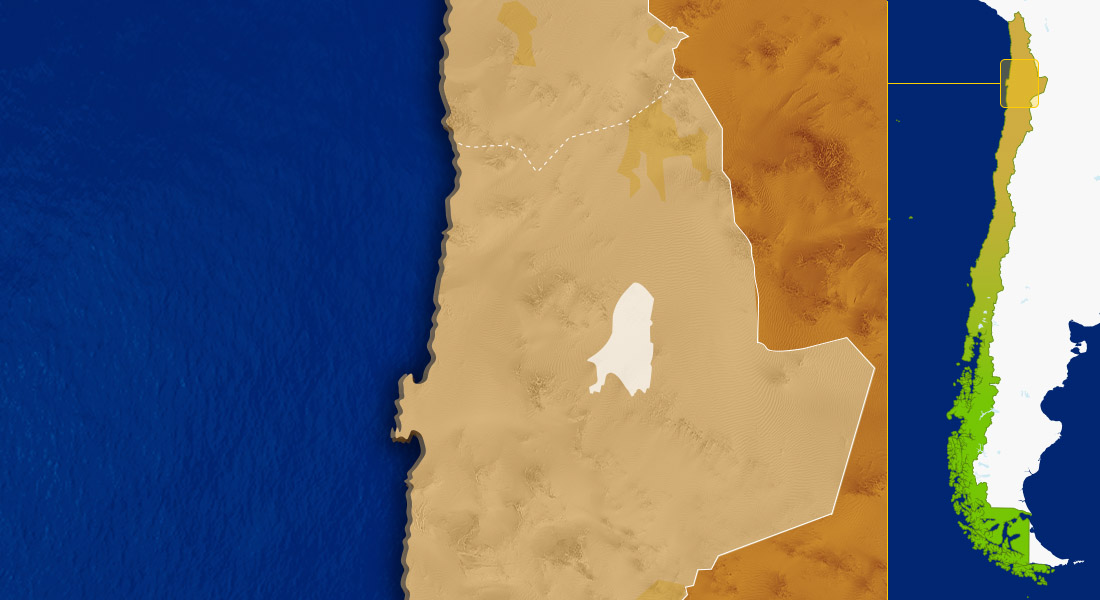
Puerto de Tocopilla
- Puerto Cowork
- Social and labor Integration
- Support Artisanal Fishermen
- Robotics and Science Program
- Environmental Forgers Network Support
- Flower Workshops
Quillagua
- Hydroponic Cooperative
- Agroforestry and Tourism Program
- Program + Mathematics
- Looms rescue and identity
- Flower Workshops
María Elena
- Robotics and Science Program
- Program + Mathematics
- Environmental Education
- Looms Rescue and Identity
- Flower Workshops
S. Pedro de Atacama
- Height Wine Ayllu
- Leveling of studies program
- Program + Mathematics
- Program + Language
- Program + Art and Culture
- Likan Antai Agricultural Lyceum Support
- Apprentices Program
Toconao
- Height Wine Ayllu
- Tockolen Indian Hotel
- Program + Mathematics
- Program + Art and Culture
- Apprentices Program
- Casa Telar Program
Talabre
- Hydroponic Greenhouse
- Alfalfa cultivation
- Program + Mathematics
- Apprentices Program
Faena Coya Sur
Faena Salar del Carmen
Faena Salar de Atacama
- Faenas Productivas
- Comunidades
PROMOTING AGRICULTURE IN PINTADOS – POZO ALMONTE
 In 2019, SQM continued its work with the Pintado Farming Colony through the Tierras de Jehová Multicultural Indigenous Association and the Juventud del Desierto Aymara Indigenous Association, while also providing specific support to local farmers.
The work has focused on fostering good agriculture practices through guidance from SQM professionals in enhancing soil structures with sand and washing to recover new arable soil; assisting with the implementation of irrigation systems designed to save water; providing agricultural equipment for soil preparation, seeds and plants, all of which is supplemented with a plant nutrition program. Other initiatives have also been carried out such as growing melons and watermelons, planting grape vines and experimenting with coconut fibers as a means to introduce new techniques as alternatives to farmland substitution.
Tierras de Jehová Multicultural Indigenous Association: the association’s eight farmers and their families have received support for enhancing soil structure and texture and purchasing agricultural machinery.
Juventud del Desierto Aymara Indigenous Association: The association’s eight farmers and their families have received support for soil enhancement, irrigation and fertilization techniques, and purchasing agricultural materials, equipment and seeds.
In 2019, SQM continued its work with the Pintado Farming Colony through the Tierras de Jehová Multicultural Indigenous Association and the Juventud del Desierto Aymara Indigenous Association, while also providing specific support to local farmers.
The work has focused on fostering good agriculture practices through guidance from SQM professionals in enhancing soil structures with sand and washing to recover new arable soil; assisting with the implementation of irrigation systems designed to save water; providing agricultural equipment for soil preparation, seeds and plants, all of which is supplemented with a plant nutrition program. Other initiatives have also been carried out such as growing melons and watermelons, planting grape vines and experimenting with coconut fibers as a means to introduce new techniques as alternatives to farmland substitution.
Tierras de Jehová Multicultural Indigenous Association: the association’s eight farmers and their families have received support for enhancing soil structure and texture and purchasing agricultural machinery.
Juventud del Desierto Aymara Indigenous Association: The association’s eight farmers and their families have received support for soil enhancement, irrigation and fertilization techniques, and purchasing agricultural materials, equipment and seeds.
POZO ALMONTE FARMERS RECEIVE 40 TONS OF ANIMAL FEED
 Twenty members of the Pampa del Tamarugal Rural Aymara Association received feed for 4,000 heads of goats and sheep in an effort to boost small stock farming in Pozo Almonte. This is the first step taken by a working group made up of representatives from SQM and the local association.
The agreement entails providing supplementary forage and feed for the goat and sheep herds along with specialized veterinary care to enhance herd management and animal production and reproduction techniques. The forty-ton supplementary feed delivery consisted of: 30 tons of alfalfa in blocks and 10 tons of concentrated feed for a total of 4,000 head of goat and sheep owned by the association’s 20 members. This is a one-time, year-long project.
In late 2019, we joined efforts with CONAF and the Pampa del Tamarugal Rural Aymara Indigenous Association to begin a three-year project starting in 2020 aimed at building a 30-hectare alfalfa production unit in the Pampa del Tamarugal National Reserve in the district of Pozo Almonte. SQM committed to designing and building the alfalfa production unit as well as financing equipment, supplies and materials. This unit is expected to serve as a source of forage and feed for small stock owned by participating association members.
Twenty members of the Pampa del Tamarugal Rural Aymara Association received feed for 4,000 heads of goats and sheep in an effort to boost small stock farming in Pozo Almonte. This is the first step taken by a working group made up of representatives from SQM and the local association.
The agreement entails providing supplementary forage and feed for the goat and sheep herds along with specialized veterinary care to enhance herd management and animal production and reproduction techniques. The forty-ton supplementary feed delivery consisted of: 30 tons of alfalfa in blocks and 10 tons of concentrated feed for a total of 4,000 head of goat and sheep owned by the association’s 20 members. This is a one-time, year-long project.
In late 2019, we joined efforts with CONAF and the Pampa del Tamarugal Rural Aymara Indigenous Association to begin a three-year project starting in 2020 aimed at building a 30-hectare alfalfa production unit in the Pampa del Tamarugal National Reserve in the district of Pozo Almonte. SQM committed to designing and building the alfalfa production unit as well as financing equipment, supplies and materials. This unit is expected to serve as a source of forage and feed for small stock owned by participating association members.
POZO ALMONTE AGRICULTURE RESEARCH AND DEVELOPMENT CENTER
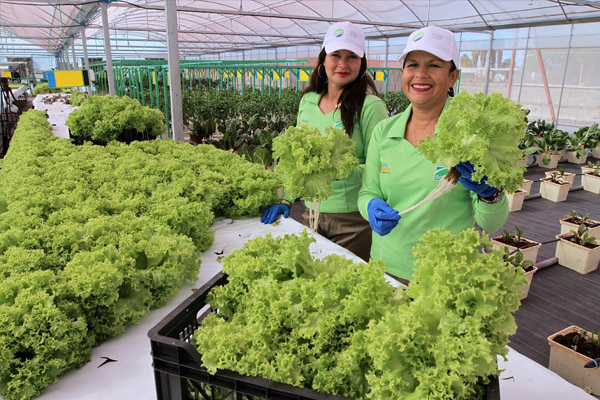 As part of our commitment of using our expertise as a specialty fertilizer producer to foster agricultural production, we opened the Pozo Almonte Agriculture Research and Development Center in 2019.
The initiative is outlined in the agreement signed by the Municipality of Pozo Almonte and SQM. The only one of its kind in the Tarapacá Region, the center’s objective is to develop hydroponic crops and produce cheese for sale on the local market.
It will train anyone wishing to grow their own hydroponic crops, providing guidance as a pilot program to identify the best business processes and production techniques. Moreover, a cooperative staffed initially by six members has been set up to manage the goat cheese production facilities.
Owned by the Pozo Almonte Municipality and located at the “Los Pinos” campground, the research center spans more than 1,150m2 divided among two buildings: one is used to grow hydroponic crops and the other one houses the cheese factory (duly certified by health authorities) along with a refrigerated delivery truck to ensure the cold chain remains intact.
In addition to the infrastructure, SQM provides technical assistance and supplies.
As part of our commitment of using our expertise as a specialty fertilizer producer to foster agricultural production, we opened the Pozo Almonte Agriculture Research and Development Center in 2019.
The initiative is outlined in the agreement signed by the Municipality of Pozo Almonte and SQM. The only one of its kind in the Tarapacá Region, the center’s objective is to develop hydroponic crops and produce cheese for sale on the local market.
It will train anyone wishing to grow their own hydroponic crops, providing guidance as a pilot program to identify the best business processes and production techniques. Moreover, a cooperative staffed initially by six members has been set up to manage the goat cheese production facilities.
Owned by the Pozo Almonte Municipality and located at the “Los Pinos” campground, the research center spans more than 1,150m2 divided among two buildings: one is used to grow hydroponic crops and the other one houses the cheese factory (duly certified by health authorities) along with a refrigerated delivery truck to ensure the cold chain remains intact.
In addition to the infrastructure, SQM provides technical assistance and supplies. PROMOTING AGRICULTURE IN PINTADOS – POZO ALMONTE
 In 2019, SQM continued its work with the Pintado Farming Colony through the Tierras de Jehová Multicultural Indigenous Association and the Juventud del Desierto Aymara Indigenous Association, while also providing specific support to local farmers.
The work has focused on fostering good agriculture practices through guidance from SQM professionals in enhancing soil structures with sand and washing to recover new arable soil; assisting with the implementation of irrigation systems designed to save water; providing agricultural equipment for soil preparation, seeds and plants, all of which is supplemented with a plant nutrition program. Other initiatives have also been carried out such as growing melons and watermelons, planting grape vines and experimenting with coconut fibers as a means to introduce new techniques as alternatives to farmland substitution.
Tierras de Jehová Multicultural Indigenous Association: the association’s eight farmers and their families have received support for enhancing soil structure and texture and purchasing agricultural machinery.
Juventud del Desierto Aymara Indigenous Association: The association’s eight farmers and their families have received support for soil enhancement, irrigation and fertilization techniques, and purchasing agricultural materials, equipment and seeds.
In 2019, SQM continued its work with the Pintado Farming Colony through the Tierras de Jehová Multicultural Indigenous Association and the Juventud del Desierto Aymara Indigenous Association, while also providing specific support to local farmers.
The work has focused on fostering good agriculture practices through guidance from SQM professionals in enhancing soil structures with sand and washing to recover new arable soil; assisting with the implementation of irrigation systems designed to save water; providing agricultural equipment for soil preparation, seeds and plants, all of which is supplemented with a plant nutrition program. Other initiatives have also been carried out such as growing melons and watermelons, planting grape vines and experimenting with coconut fibers as a means to introduce new techniques as alternatives to farmland substitution.
Tierras de Jehová Multicultural Indigenous Association: the association’s eight farmers and their families have received support for enhancing soil structure and texture and purchasing agricultural machinery.
Juventud del Desierto Aymara Indigenous Association: The association’s eight farmers and their families have received support for soil enhancement, irrigation and fertilization techniques, and purchasing agricultural materials, equipment and seeds. MATHEMATICS ASSISTANCE PROGRAM
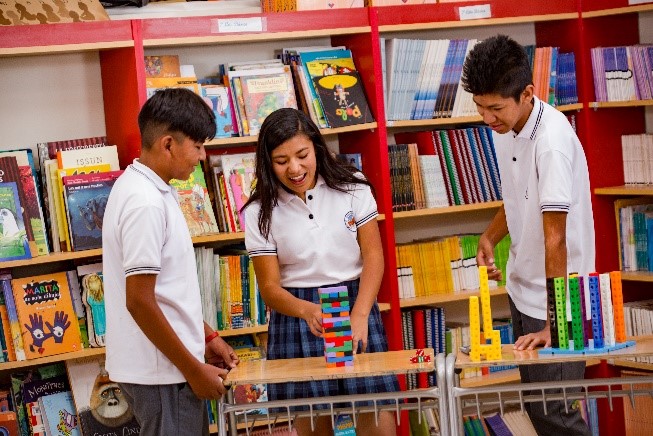 For the seventh year in a row, the collaborative effort between SQM and the Crea+ Foundation continues to bear fruit both qualitatively and quantitatively. This well-rooted program still pulls in good results and is valued by both teachers and administrators at participating establishments.
During 2019, the program had a direct impact on 1,620 students and 49 teachers at the following participating schools: Arturo Pérez Canto, Ignacio Carrera Pinto, Oasis del Desierto, Camar, San Bartolomé, Solor, San Pedro de Atacama, San Roque, Toconao Educational Complex and Talabre.
This is our third year supporting an internship overseas in finland by awarding grants to the following three professionals who stand out for their performance and commitment to their students: Sandra Chávez, head of the San Roque de Peine school; Carla Michea, teacher at the Arturo Pérez Canto school in María Elena; and Denissa Opazo from the Oasis en el Desierto school in Pozo Almonte.
For the seventh year in a row, the collaborative effort between SQM and the Crea+ Foundation continues to bear fruit both qualitatively and quantitatively. This well-rooted program still pulls in good results and is valued by both teachers and administrators at participating establishments.
During 2019, the program had a direct impact on 1,620 students and 49 teachers at the following participating schools: Arturo Pérez Canto, Ignacio Carrera Pinto, Oasis del Desierto, Camar, San Bartolomé, Solor, San Pedro de Atacama, San Roque, Toconao Educational Complex and Talabre.
This is our third year supporting an internship overseas in finland by awarding grants to the following three professionals who stand out for their performance and commitment to their students: Sandra Chávez, head of the San Roque de Peine school; Carla Michea, teacher at the Arturo Pérez Canto school in María Elena; and Denissa Opazo from the Oasis en el Desierto school in Pozo Almonte.
SUPPORTING NEIGHBORS AND THEIR EMPLOYABILITY
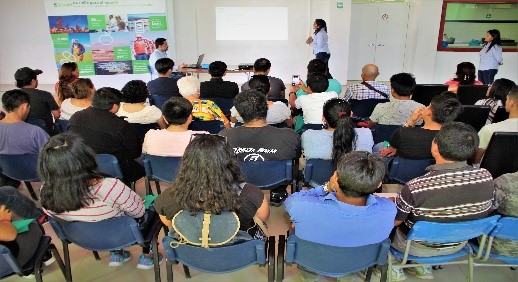 We are committed to supporting the communities near our operations in the Tarapacá and Antofagasta Regions, and as such we continue to hold “Employability Workshops.” Run by SQM psychologists who teach participants how to prepare for job interviews and write resumes, these workshops also provide participants the opportunity to apply for job openings available in the Company. These workshops seek to increase the number of locals working at SQM sites.
This effort is carried out in conjunction with various Employment Opportunity offices located in area towns such as Pozo Almonte and Alto Hospicio.
We are committed to supporting the communities near our operations in the Tarapacá and Antofagasta Regions, and as such we continue to hold “Employability Workshops.” Run by SQM psychologists who teach participants how to prepare for job interviews and write resumes, these workshops also provide participants the opportunity to apply for job openings available in the Company. These workshops seek to increase the number of locals working at SQM sites.
This effort is carried out in conjunction with various Employment Opportunity offices located in area towns such as Pozo Almonte and Alto Hospicio.
PROMOTING AGRICULTURE IN PINTADOS – POZO ALMONTE
 In 2019, SQM continued its work with the Pintado Farming Colony through the Tierras de Jehová Multicultural Indigenous Association and the Juventud del Desierto Aymara Indigenous Association, while also providing specific support to local farmers.
The work has focused on fostering good agriculture practices through guidance from SQM professionals in enhancing soil structures with sand and washing to recover new arable soil; assisting with the implementation of irrigation systems designed to save water; providing agricultural equipment for soil preparation, seeds and plants, all of which is supplemented with a plant nutrition program. Other initiatives have also been carried out such as growing melons and watermelons, planting grape vines and experimenting with coconut fibers as a means to introduce new techniques as alternatives to farmland substitution.
Tierras de Jehová Multicultural Indigenous Association: the association’s eight farmers and their families have received support for enhancing soil structure and texture and purchasing agricultural machinery.
Juventud del Desierto Aymara Indigenous Association: The association’s eight farmers and their families have received support for soil enhancement, irrigation and fertilization techniques, and purchasing agricultural materials, equipment and seeds.
In 2019, SQM continued its work with the Pintado Farming Colony through the Tierras de Jehová Multicultural Indigenous Association and the Juventud del Desierto Aymara Indigenous Association, while also providing specific support to local farmers.
The work has focused on fostering good agriculture practices through guidance from SQM professionals in enhancing soil structures with sand and washing to recover new arable soil; assisting with the implementation of irrigation systems designed to save water; providing agricultural equipment for soil preparation, seeds and plants, all of which is supplemented with a plant nutrition program. Other initiatives have also been carried out such as growing melons and watermelons, planting grape vines and experimenting with coconut fibers as a means to introduce new techniques as alternatives to farmland substitution.
Tierras de Jehová Multicultural Indigenous Association: the association’s eight farmers and their families have received support for enhancing soil structure and texture and purchasing agricultural machinery.
Juventud del Desierto Aymara Indigenous Association: The association’s eight farmers and their families have received support for soil enhancement, irrigation and fertilization techniques, and purchasing agricultural materials, equipment and seeds. PROGRAM FOR REVIVING GARLIC PRODUCTION
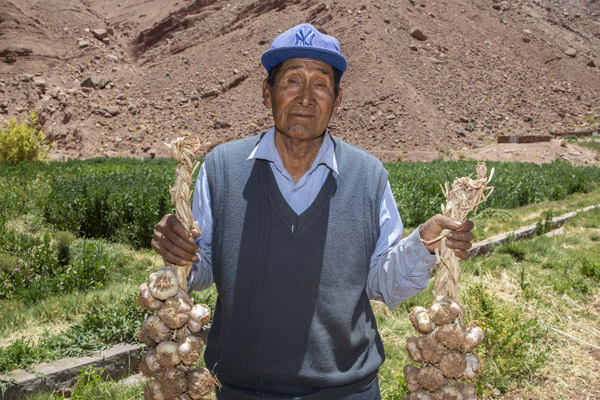 Activities carried out in 2019 under the Rio Grand garlic production program consisted of helping disinfect farmland with products that have a low impact on local ecosystems, and repeating the treatment when diseases were detected further on in the cycle. A total of 23 farmers participated in the garlic farming program, 15 of which were assigned to growing garlic while the remainder tended rotational crops designed for disease control. Production levels remained stable at 70% on average, with farmers’ yields ranging from 14 to 17 tons per hectare, which has had a considerably positive impact on the community.
A new Río Grande farm (Hierbas Buenas) joined the project in 2019, adding 30 hectares of arable land. The first wave of support consisted of preliminary civil works.
Activities carried out in 2019 under the Rio Grand garlic production program consisted of helping disinfect farmland with products that have a low impact on local ecosystems, and repeating the treatment when diseases were detected further on in the cycle. A total of 23 farmers participated in the garlic farming program, 15 of which were assigned to growing garlic while the remainder tended rotational crops designed for disease control. Production levels remained stable at 70% on average, with farmers’ yields ranging from 14 to 17 tons per hectare, which has had a considerably positive impact on the community.
A new Río Grande farm (Hierbas Buenas) joined the project in 2019, adding 30 hectares of arable land. The first wave of support consisted of preliminary civil works.
EXPERT APPRENTICES FOR SQM
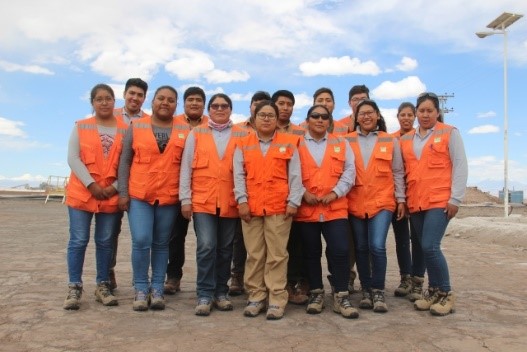 This is the second year that SQM has committed to an apprentice program at the Salar de Atacama operations, led by SQM supervisors and operators who had previously taken part in “train the trainers” sessions. This program brought together 26 apprentices—men and women from the communities of Toconao, Peine, Socaire, Río Grande, Camar and San Pedro de Atacama—who have joined different areas of the operations on open-term contracts.
Participants rotated through nine modules in three months, acquiring soft skills and technical tools. At the end of the apprenticeship they were offered open-term contracts in different areas of SQM’s Salar de Atacama operations.
This is the second year that SQM has committed to an apprentice program at the Salar de Atacama operations, led by SQM supervisors and operators who had previously taken part in “train the trainers” sessions. This program brought together 26 apprentices—men and women from the communities of Toconao, Peine, Socaire, Río Grande, Camar and San Pedro de Atacama—who have joined different areas of the operations on open-term contracts.
Participants rotated through nine modules in three months, acquiring soft skills and technical tools. At the end of the apprenticeship they were offered open-term contracts in different areas of SQM’s Salar de Atacama operations. HYDROPONIC PRODUCTION PROGRAM IN SOCAIRE AND TALABRE
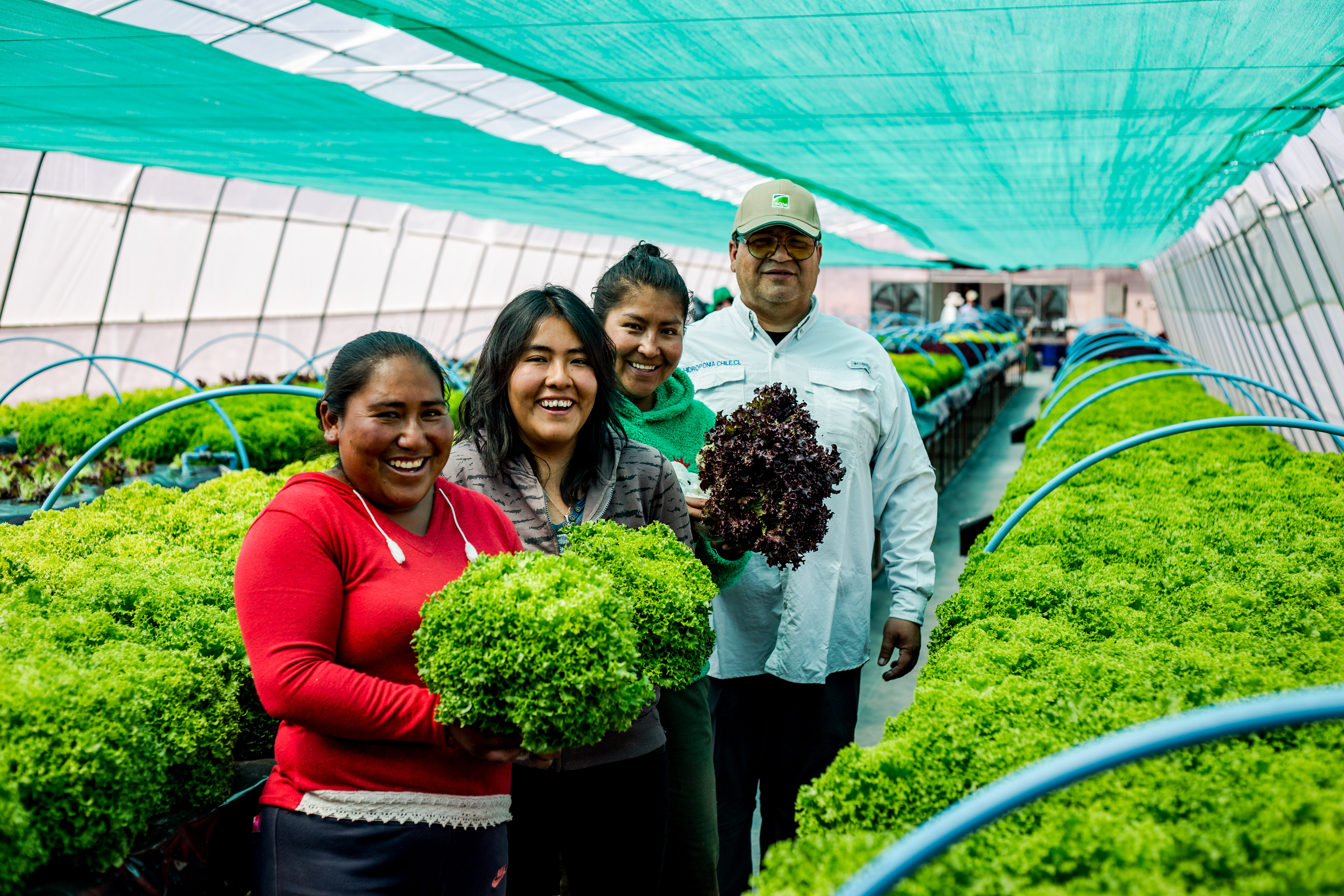 This hydroponic production project was launched back in 2016 in Socaire as a local research center for identifying which crop species and varieties are most suited for hydroponic production in the village.
At present, 6,000 heads of lettuce are grown monthly at the 1,000m2 production site, which employed four full-time local employees in 2019.
The same program was replicated in the community of Talabre, where they also decided to grow fruit and leafy vegetables in live substrates, which led to hiring five traditional farmers.
The program turned its efforts to upgrading and repairing infrastructure in 2019 along with building new civil works to support production, while continuing to provide technical support and monitor production.
This hydroponic production project was launched back in 2016 in Socaire as a local research center for identifying which crop species and varieties are most suited for hydroponic production in the village.
At present, 6,000 heads of lettuce are grown monthly at the 1,000m2 production site, which employed four full-time local employees in 2019.
The same program was replicated in the community of Talabre, where they also decided to grow fruit and leafy vegetables in live substrates, which led to hiring five traditional farmers.
The program turned its efforts to upgrading and repairing infrastructure in 2019 along with building new civil works to support production, while continuing to provide technical support and monitor production.
QUILLAGUA’S AGROFORESTRY AND TOURISM PROGRAM
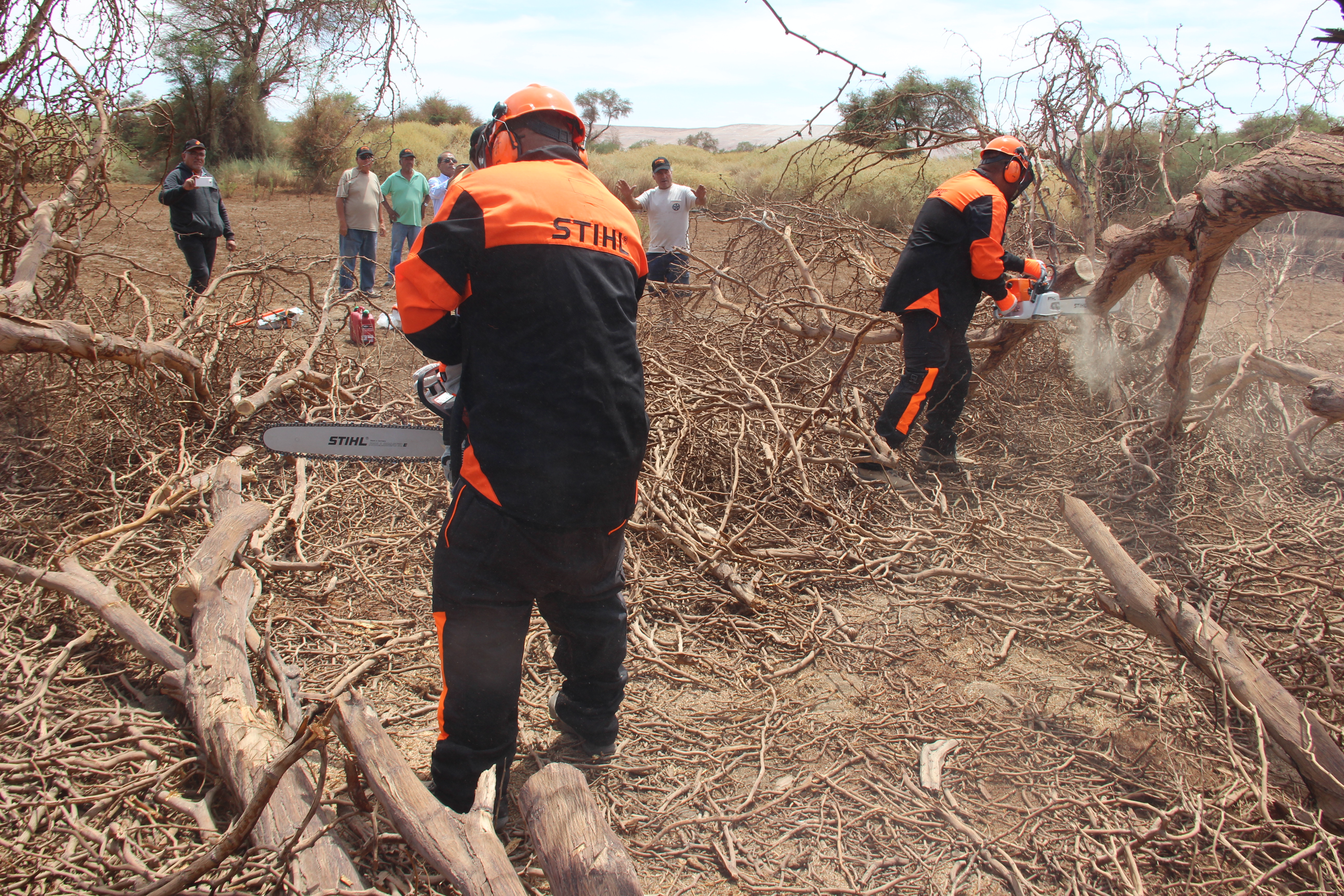 SQM donated machinery and training that will enable the Indigenous Agroforestry Association in the oasis of Quillagua to add value to one of the valley’s most important resources: the Algarrobo tree and its derivatives. In 2019, efforts focused on defining the Agroforest Cluster and other measures such as hiring a forestry engineer to develop adhesion standards required by CONAF for sustainable exploitation of the forest; consultant services for designing the logo for the coal and advice for local small business owners who designed an artisan workshop proposal and alternatives for manufacturing pieces.
Plans have been drawn up to build a craft workshop in 2020. The shopkeeper and site are already arranged.
SQM donated machinery and training that will enable the Indigenous Agroforestry Association in the oasis of Quillagua to add value to one of the valley’s most important resources: the Algarrobo tree and its derivatives. In 2019, efforts focused on defining the Agroforest Cluster and other measures such as hiring a forestry engineer to develop adhesion standards required by CONAF for sustainable exploitation of the forest; consultant services for designing the logo for the coal and advice for local small business owners who designed an artisan workshop proposal and alternatives for manufacturing pieces.
Plans have been drawn up to build a craft workshop in 2020. The shopkeeper and site are already arranged.
MATHEMATICS ASSISTANCE PROGRAM
 For the seventh year in a row, the collaborative effort between SQM and the Crea+ Foundation continues to bear fruit both qualitatively and quantitatively. This well-rooted program still pulls in good results and is valued by both teachers and administrators at participating establishments.
During 2019, the program had a direct impact on 1,620 students and 49 teachers at the following participating schools: Arturo Pérez Canto, Ignacio Carrera Pinto, Oasis del Desierto, Camar, San Bartolomé, Solor, San Pedro de Atacama, San Roque, Toconao Educational Complex and Talabre.
This is our third year supporting an internship overseas in finland by awarding grants to the following three professionals who stand out for their performance and commitment to their students: Sandra Chávez, head of the San Roque de Peine school; Carla Michea, teacher at the Arturo Pérez Canto school in María Elena; and Denissa Opazo from the Oasis en el Desierto school in Pozo Almonte.
For the seventh year in a row, the collaborative effort between SQM and the Crea+ Foundation continues to bear fruit both qualitatively and quantitatively. This well-rooted program still pulls in good results and is valued by both teachers and administrators at participating establishments.
During 2019, the program had a direct impact on 1,620 students and 49 teachers at the following participating schools: Arturo Pérez Canto, Ignacio Carrera Pinto, Oasis del Desierto, Camar, San Bartolomé, Solor, San Pedro de Atacama, San Roque, Toconao Educational Complex and Talabre.
This is our third year supporting an internship overseas in finland by awarding grants to the following three professionals who stand out for their performance and commitment to their students: Sandra Chávez, head of the San Roque de Peine school; Carla Michea, teacher at the Arturo Pérez Canto school in María Elena; and Denissa Opazo from the Oasis en el Desierto school in Pozo Almonte.
FLOWER WORKSHOPS
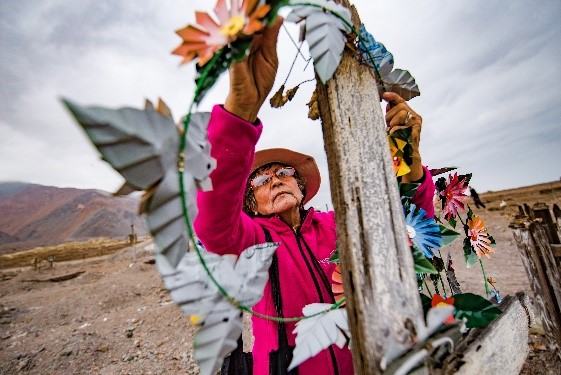 The making of tin and paper flower crowns is a tradition that dates back to the splendor of saltpeter. Families took root in this Pampa tradition to worship their loved ones who participated, funeral art compatible with the extreme climate of the pampa and that filled with color the cemeteries of the former nitrate offices in northern Chile.
To continue rescuing and valuing this Pampa tradition, the workshop that SQM has been promoting for 8 years culminates with a pilgrimage to different nitrate cemeteries in the Antofagasta and Tarapacá regions for the day of all saints, a journey that the students of the Workshop with a bronze band to take their art to the cemeteries that lie in the vastness of the calichera pampa. Additionally in 2019 in Iquique the paper flowers were rescued.
The making of tin and paper flower crowns is a tradition that dates back to the splendor of saltpeter. Families took root in this Pampa tradition to worship their loved ones who participated, funeral art compatible with the extreme climate of the pampa and that filled with color the cemeteries of the former nitrate offices in northern Chile.
To continue rescuing and valuing this Pampa tradition, the workshop that SQM has been promoting for 8 years culminates with a pilgrimage to different nitrate cemeteries in the Antofagasta and Tarapacá regions for the day of all saints, a journey that the students of the Workshop with a bronze band to take their art to the cemeteries that lie in the vastness of the calichera pampa. Additionally in 2019 in Iquique the paper flowers were rescued.
AYMARA GASTRONOMY
 “Saberes y Sabores de Nuestra Tierra” is the name of the gastronomy program that SQM promoted in Quillagüa, and that was born in 2017 to rescue and spread the ancestral culinary art of the Aymara people, reviving traditions, celebrations, family rites and experiences that have been Transmitted from generation to generation, and which are reflected in exquisite preparations and typical dishes.
The members have crossed the borders of Quillagua to spread their valuable culinary culture in important gastronomic gatherings.
“Saberes y Sabores de Nuestra Tierra” is the name of the gastronomy program that SQM promoted in Quillagüa, and that was born in 2017 to rescue and spread the ancestral culinary art of the Aymara people, reviving traditions, celebrations, family rites and experiences that have been Transmitted from generation to generation, and which are reflected in exquisite preparations and typical dishes.
The members have crossed the borders of Quillagua to spread their valuable culinary culture in important gastronomic gatherings. DRIVING ROBOTICS AND SCIENCE WITH ViLTI SeMANN
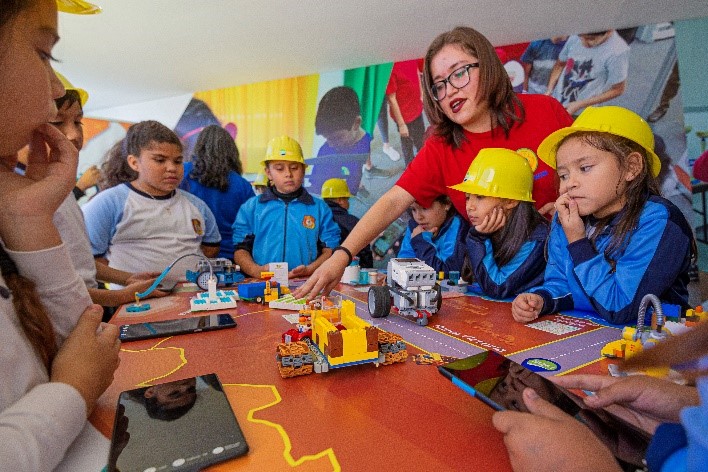 SQM is a supporter of the ViLTI SeMANN Program. Managed by Universidad Católica del Norte (UCN) in Tocopilla and in its fourth year, this program is designed to boost primary education among boys and girls ages 4 to 9.
In 2019, a total of 80 students from seven education establishments in Tocopilla participated in this program. Its objectives are to: close educational gaps, promote creative talent and contribute to equal opportunities in education (knowledge). Bringing science and robotics closer to the students through fun and engaging learning techniques.
The most noteworthy achievements this year included sending three students from Tocopilla schools to the National Robotics Tournament held in Santiago, where they got to not only experience the trip itself but also spend time with boys and girls from other regions.
Also, for the first time this year, the ViLTI SeMANN Program was held in María Elena, benefiting 20 boys and girls ages 5 to 7 years form the Arturo Pérez Canto School. Similar to their peers in Tocopilla, these children had the opportunity to develop their critical thinking skills through games, singing and dancing, all related to the world of robotics.
SQM is a supporter of the ViLTI SeMANN Program. Managed by Universidad Católica del Norte (UCN) in Tocopilla and in its fourth year, this program is designed to boost primary education among boys and girls ages 4 to 9.
In 2019, a total of 80 students from seven education establishments in Tocopilla participated in this program. Its objectives are to: close educational gaps, promote creative talent and contribute to equal opportunities in education (knowledge). Bringing science and robotics closer to the students through fun and engaging learning techniques.
The most noteworthy achievements this year included sending three students from Tocopilla schools to the National Robotics Tournament held in Santiago, where they got to not only experience the trip itself but also spend time with boys and girls from other regions.
Also, for the first time this year, the ViLTI SeMANN Program was held in María Elena, benefiting 20 boys and girls ages 5 to 7 years form the Arturo Pérez Canto School. Similar to their peers in Tocopilla, these children had the opportunity to develop their critical thinking skills through games, singing and dancing, all related to the world of robotics.
MATHEMATICS ASSISTANCE PROGRAM
 For the seventh year in a row, the collaborative effort between SQM and the Crea+ Foundation continues to bear fruit both qualitatively and quantitatively. This well-rooted program still pulls in good results and is valued by both teachers and administrators at participating establishments.
During 2019, the program had a direct impact on 1,620 students and 49 teachers at the following participating schools: Arturo Pérez Canto, Ignacio Carrera Pinto, Oasis del Desierto, Camar, San Bartolomé, Solor, San Pedro de Atacama, San Roque, Toconao Educational Complex and Talabre.
This is our third year supporting an internship overseas in finland by awarding grants to the following three professionals who stand out for their performance and commitment to their students: Sandra Chávez, head of the San Roque de Peine school; Carla Michea, teacher at the Arturo Pérez Canto school in María Elena; and Denissa Opazo from the Oasis en el Desierto school in Pozo Almonte.
For the seventh year in a row, the collaborative effort between SQM and the Crea+ Foundation continues to bear fruit both qualitatively and quantitatively. This well-rooted program still pulls in good results and is valued by both teachers and administrators at participating establishments.
During 2019, the program had a direct impact on 1,620 students and 49 teachers at the following participating schools: Arturo Pérez Canto, Ignacio Carrera Pinto, Oasis del Desierto, Camar, San Bartolomé, Solor, San Pedro de Atacama, San Roque, Toconao Educational Complex and Talabre.
This is our third year supporting an internship overseas in finland by awarding grants to the following three professionals who stand out for their performance and commitment to their students: Sandra Chávez, head of the San Roque de Peine school; Carla Michea, teacher at the Arturo Pérez Canto school in María Elena; and Denissa Opazo from the Oasis en el Desierto school in Pozo Almonte.
RECYCLING FROM THE CLASSROOM AND AT HOME - MARÍA ELENA
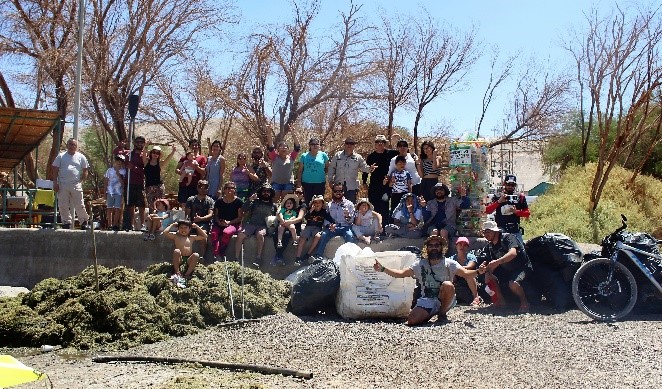 In order to foster environmental care and education, we held the first recycling contest in María Elena. Community members, 10 social organizations, schools, daycare centers and local municipality all participated. Participants rallied under the motto “sport a shirt” for recycling and formed groups to clean the streets, home and community areas in the pampa town, all organized by the Mr. Barber Foundation.
Local María Elena residents attended educational lectures aimed at making them more informed for responsible environmental decision making. A total of 11.8 tons of recycled material were collected during the campaign, all with a positive impact on the local environment.
Part of the Company’s ongoing efforts to preserve water resources involve providing support for the first environmental fair held in María Elena in collaboration with the Mr. Barber Foundation and the Municipality of María Elena. This fair also marked the closure of the “I Love you, Water” Campaign.
This campaign set out to raise awareness about the importance of using water efficiently and showcase various water savings techniques. The campaign included the following initiatives: installing 100 water saving kits; a major field awareness campaign; and a school contest to foster creative ways students can save water. All of these activities were aimed at involving and educating the community.
In order to foster environmental care and education, we held the first recycling contest in María Elena. Community members, 10 social organizations, schools, daycare centers and local municipality all participated. Participants rallied under the motto “sport a shirt” for recycling and formed groups to clean the streets, home and community areas in the pampa town, all organized by the Mr. Barber Foundation.
Local María Elena residents attended educational lectures aimed at making them more informed for responsible environmental decision making. A total of 11.8 tons of recycled material were collected during the campaign, all with a positive impact on the local environment.
Part of the Company’s ongoing efforts to preserve water resources involve providing support for the first environmental fair held in María Elena in collaboration with the Mr. Barber Foundation and the Municipality of María Elena. This fair also marked the closure of the “I Love you, Water” Campaign.
This campaign set out to raise awareness about the importance of using water efficiently and showcase various water savings techniques. The campaign included the following initiatives: installing 100 water saving kits; a major field awareness campaign; and a school contest to foster creative ways students can save water. All of these activities were aimed at involving and educating the community.
FLOWER WORKSHOPS
 The making of tin and paper flower crowns is a tradition that dates back to the splendor of saltpeter. Families took root in this Pampa tradition to worship their loved ones who participated, funeral art compatible with the extreme climate of the pampa and that filled with color the cemeteries of the former nitrate offices in northern Chile.
To continue rescuing and valuing this Pampa tradition, the workshop that SQM has been promoting for 8 years culminates with a pilgrimage to different nitrate cemeteries in the Antofagasta and Tarapacá regions for the day of all saints, a journey that the students of the Workshop with a bronze band to take their art to the cemeteries that lie in the vastness of the calichera pampa. Additionally in 2019 in Iquique the paper flowers were rescued.
The making of tin and paper flower crowns is a tradition that dates back to the splendor of saltpeter. Families took root in this Pampa tradition to worship their loved ones who participated, funeral art compatible with the extreme climate of the pampa and that filled with color the cemeteries of the former nitrate offices in northern Chile.
To continue rescuing and valuing this Pampa tradition, the workshop that SQM has been promoting for 8 years culminates with a pilgrimage to different nitrate cemeteries in the Antofagasta and Tarapacá regions for the day of all saints, a journey that the students of the Workshop with a bronze band to take their art to the cemeteries that lie in the vastness of the calichera pampa. Additionally in 2019 in Iquique the paper flowers were rescued.
“TEJIENDO NUESTRA PAMPA”
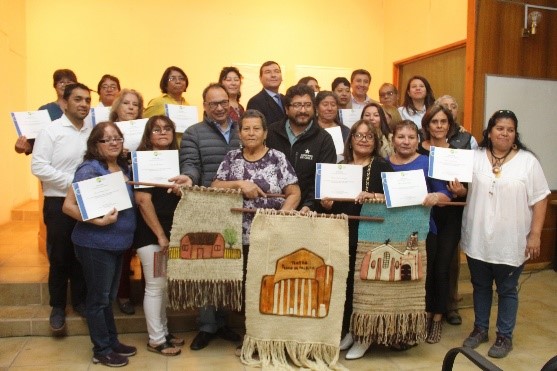 A group of women from María Elena and Quillagua participate in the “Tejiendo Nuestra Pampa” workshop, an initiative promoted by SQM, Fosis, La Semilla Foundation and the municipality of Maria Elena, whose work plan includes the search for constituent elements of the Pampa identity, such as the native flora, heritage buildings, saltpeter elements, among others, and which were reflected in each work designed by the Pampas weavers.
It is an opportunity for personal development and entrepreneurship for all the women who participate to formalize and concretize their business ideas, providing them with public and cultural spaces that encourage the dissemination of the Pampa identity through the textile works produced by a group of committed pampinas women.
A group of women from María Elena and Quillagua participate in the “Tejiendo Nuestra Pampa” workshop, an initiative promoted by SQM, Fosis, La Semilla Foundation and the municipality of Maria Elena, whose work plan includes the search for constituent elements of the Pampa identity, such as the native flora, heritage buildings, saltpeter elements, among others, and which were reflected in each work designed by the Pampas weavers.
It is an opportunity for personal development and entrepreneurship for all the women who participate to formalize and concretize their business ideas, providing them with public and cultural spaces that encourage the dissemination of the Pampa identity through the textile works produced by a group of committed pampinas women. ALFALFA CROP STARTUP PROGRAM
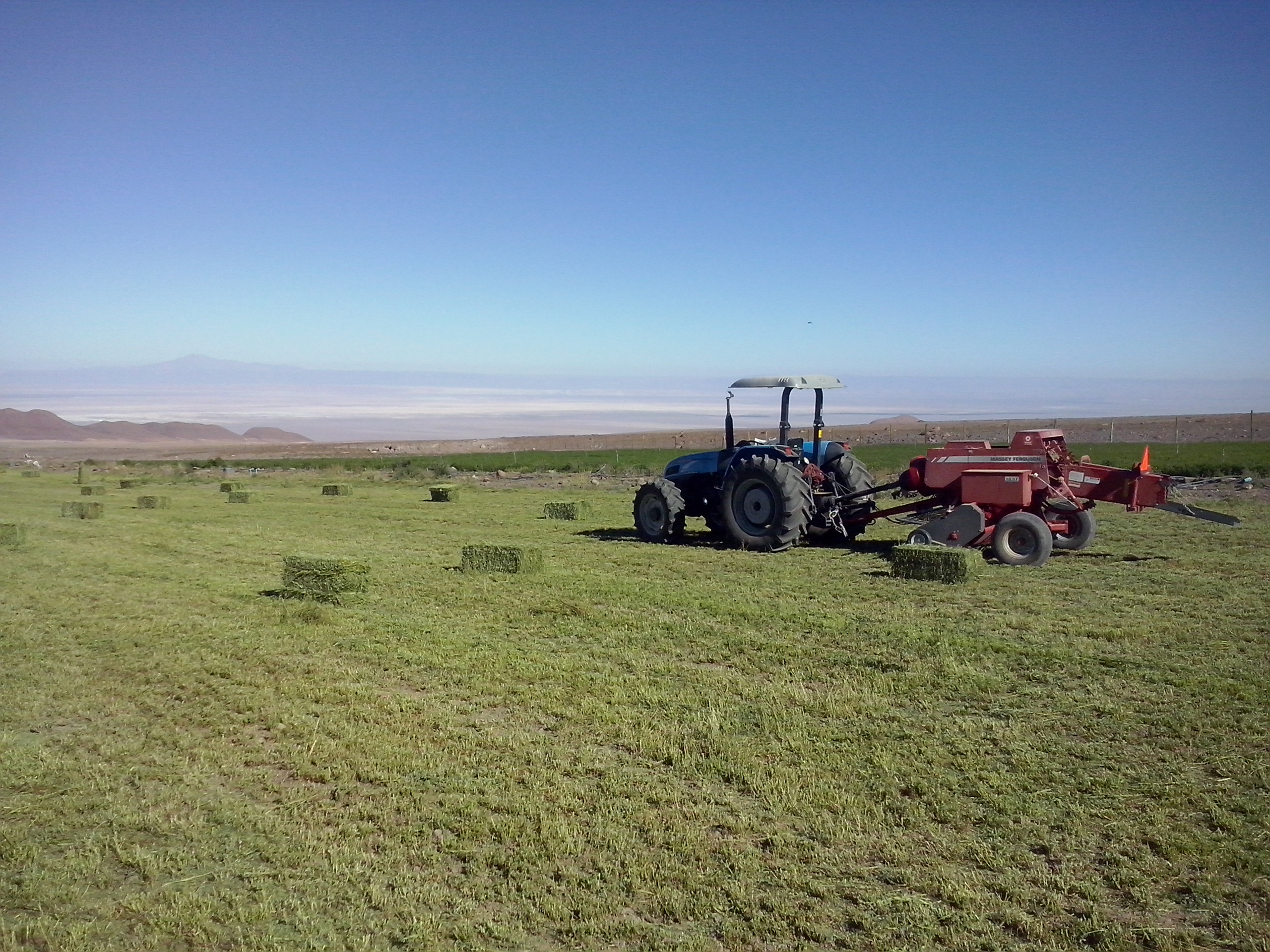 Established in 2008 in Talabre, this program began by sowing 0.2 hectares of drip-irrigated fields of alfalfa in order to boost water efficiency and crop yield. Once the technique was approved by the farmers and the local community in 2011, the program was expanded through support from the Foundation for Farming Innovation to include research and training.
In 2019, the project successfully planted an additional 5.2 hectares of alfalfa, which were divided evenly among the 25 participating farmers, for a grand total of 12 hectares of crops produced under the system, yielding 9 tons of forage per hectare earmarked for the community’s livestock. The program also provided support in the form of new machinery and maintenance on existing equipment.
Established in 2008 in Talabre, this program began by sowing 0.2 hectares of drip-irrigated fields of alfalfa in order to boost water efficiency and crop yield. Once the technique was approved by the farmers and the local community in 2011, the program was expanded through support from the Foundation for Farming Innovation to include research and training.
In 2019, the project successfully planted an additional 5.2 hectares of alfalfa, which were divided evenly among the 25 participating farmers, for a grand total of 12 hectares of crops produced under the system, yielding 9 tons of forage per hectare earmarked for the community’s livestock. The program also provided support in the form of new machinery and maintenance on existing equipment.
MATHEMATICS ASSISTANCE PROGRAM
 For the seventh year in a row, the collaborative effort between SQM and the Crea+ Foundation continues to bear fruit both qualitatively and quantitatively. This well-rooted program still pulls in good results and is valued by both teachers and administrators at participating establishments.
During 2019, the program had a direct impact on 1,620 students and 49 teachers at the following participating schools: Arturo Pérez Canto, Ignacio Carrera Pinto, Oasis del Desierto, Camar, San Bartolomé, Solor, San Pedro de Atacama, San Roque, Toconao Educational Complex and Talabre.
This is our third year supporting an internship overseas in finland by awarding grants to the following three professionals who stand out for their performance and commitment to their students: Sandra Chávez, head of the San Roque de Peine school; Carla Michea, teacher at the Arturo Pérez Canto school in María Elena; and Denissa Opazo from the Oasis en el Desierto school in Pozo Almonte.
For the seventh year in a row, the collaborative effort between SQM and the Crea+ Foundation continues to bear fruit both qualitatively and quantitatively. This well-rooted program still pulls in good results and is valued by both teachers and administrators at participating establishments.
During 2019, the program had a direct impact on 1,620 students and 49 teachers at the following participating schools: Arturo Pérez Canto, Ignacio Carrera Pinto, Oasis del Desierto, Camar, San Bartolomé, Solor, San Pedro de Atacama, San Roque, Toconao Educational Complex and Talabre.
This is our third year supporting an internship overseas in finland by awarding grants to the following three professionals who stand out for their performance and commitment to their students: Sandra Chávez, head of the San Roque de Peine school; Carla Michea, teacher at the Arturo Pérez Canto school in María Elena; and Denissa Opazo from the Oasis en el Desierto school in Pozo Almonte.
EXPERT APPRENTICES FOR SQM
 This is the second year that SQM has committed to an apprentice program at the Salar de Atacama operations, led by SQM supervisors and operators who had previously taken part in “train the trainers” sessions. This program brought together 26 apprentices—men and women from the communities of Toconao, Peine, Socaire, Río Grande, Camar and San Pedro de Atacama—who have joined different areas of the operations on open-term contracts.
Participants rotated through nine modules in three months, acquiring soft skills and technical tools. At the end of the apprenticeship they were offered open-term contracts in different areas of SQM’s Salar de Atacama operations.
This is the second year that SQM has committed to an apprentice program at the Salar de Atacama operations, led by SQM supervisors and operators who had previously taken part in “train the trainers” sessions. This program brought together 26 apprentices—men and women from the communities of Toconao, Peine, Socaire, Río Grande, Camar and San Pedro de Atacama—who have joined different areas of the operations on open-term contracts.
Participants rotated through nine modules in three months, acquiring soft skills and technical tools. At the end of the apprenticeship they were offered open-term contracts in different areas of SQM’s Salar de Atacama operations. AYLLU WINE
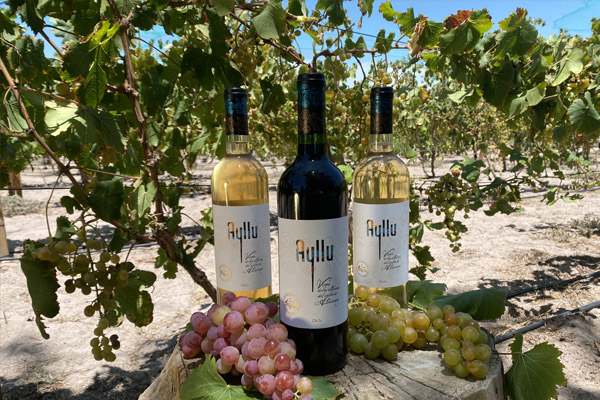 As part of the SQM Atacama Tierra Fértil Program, a group of 19 farmers from Celeste, Toconao, San Pedro de Atacama and Socaire produce high-altitude wine at more than 2,400 meters above sea level.
Ayllu vineyards celebrated their seventh harvest in 2019. Ayllu, which stands for community in Kunza, is an example of the local desire to develop a wine industry on the basis of modern techniques and technical assistance from Chilean and international expert consultants instead of traditional methods.
Ayllu is a signature wine. Each bottle is labeled with the number of square meters, number of vines per lot, number of bottles produced per year and elevation of the vineyard. These unique features are what have enabled the wine to be sold at hotels and restaurants throughout the Antofagasta Region.
Wine is currently produced from the following grape varieties: Chardonnay, Petit Verdot, Pinot Noir, Syrah, Malbec, Moscatel, the traditional Chilean grape País and the recently added Sauvignon Gris.
A total of 5,297 bottles of wine were produced in 2019—up 6% from 2018—which is quite a success considering the extreme climate events affecting the region this year.
SQM’s support centered around providing technical monitoring and consulting during every stage of production, with an emphasis on the cooperative’s work and the combined effort of the team of associates.
As part of the SQM Atacama Tierra Fértil Program, a group of 19 farmers from Celeste, Toconao, San Pedro de Atacama and Socaire produce high-altitude wine at more than 2,400 meters above sea level.
Ayllu vineyards celebrated their seventh harvest in 2019. Ayllu, which stands for community in Kunza, is an example of the local desire to develop a wine industry on the basis of modern techniques and technical assistance from Chilean and international expert consultants instead of traditional methods.
Ayllu is a signature wine. Each bottle is labeled with the number of square meters, number of vines per lot, number of bottles produced per year and elevation of the vineyard. These unique features are what have enabled the wine to be sold at hotels and restaurants throughout the Antofagasta Region.
Wine is currently produced from the following grape varieties: Chardonnay, Petit Verdot, Pinot Noir, Syrah, Malbec, Moscatel, the traditional Chilean grape País and the recently added Sauvignon Gris.
A total of 5,297 bottles of wine were produced in 2019—up 6% from 2018—which is quite a success considering the extreme climate events affecting the region this year.
SQM’s support centered around providing technical monitoring and consulting during every stage of production, with an emphasis on the cooperative’s work and the combined effort of the team of associates.
SECOND-CHANCE EDUCATION PROGRAM – SAN PEDRO DE ATACAMA
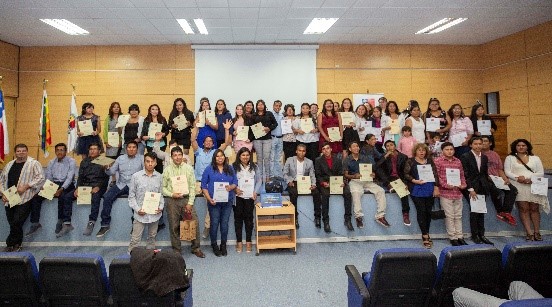 For the second consecutive year, SQM works with the Municipality of San Pedro de Atacama’s Employment Information Office (OMIL) on developing the Second-Chance Education Program that benefits 87 youth and adult community members. The program has been instrumental in providing participants the opportunity to finish their studies between 5th and 12th grade, thereby providing them with the tools they need to secure better job opportunities.
87 youth community members finished their elementary and secondary schooling.
For the second consecutive year, SQM works with the Municipality of San Pedro de Atacama’s Employment Information Office (OMIL) on developing the Second-Chance Education Program that benefits 87 youth and adult community members. The program has been instrumental in providing participants the opportunity to finish their studies between 5th and 12th grade, thereby providing them with the tools they need to secure better job opportunities.
87 youth community members finished their elementary and secondary schooling.
MATHEMATICS ASSISTANCE PROGRAM
 For the seventh year in a row, the collaborative effort between SQM and the Crea+ Foundation continues to bear fruit both qualitatively and quantitatively. This well-rooted program still pulls in good results and is valued by both teachers and administrators at participating establishments.
During 2019, the program had a direct impact on 1,620 students and 49 teachers at the following participating schools: Arturo Pérez Canto, Ignacio Carrera Pinto, Oasis del Desierto, Camar, San Bartolomé, Solor, San Pedro de Atacama, San Roque, Toconao Educational Complex and Talabre.
This is our third year supporting an internship overseas in finland by awarding grants to the following three professionals who stand out for their performance and commitment to their students: Sandra Chávez, head of the San Roque de Peine school; Carla Michea, teacher at the Arturo Pérez Canto school in María Elena; and Denissa Opazo from the Oasis en el Desierto school in Pozo Almonte.
For the seventh year in a row, the collaborative effort between SQM and the Crea+ Foundation continues to bear fruit both qualitatively and quantitatively. This well-rooted program still pulls in good results and is valued by both teachers and administrators at participating establishments.
During 2019, the program had a direct impact on 1,620 students and 49 teachers at the following participating schools: Arturo Pérez Canto, Ignacio Carrera Pinto, Oasis del Desierto, Camar, San Bartolomé, Solor, San Pedro de Atacama, San Roque, Toconao Educational Complex and Talabre.
This is our third year supporting an internship overseas in finland by awarding grants to the following three professionals who stand out for their performance and commitment to their students: Sandra Chávez, head of the San Roque de Peine school; Carla Michea, teacher at the Arturo Pérez Canto school in María Elena; and Denissa Opazo from the Oasis en el Desierto school in Pozo Almonte.
EXPERT APPRENTICES FOR SQM
 This is the second year that SQM has committed to an apprentice program at the Salar de Atacama operations, led by SQM supervisors and operators who had previously taken part in “train the trainers” sessions. This program brought together 26 apprentices—men and women from the communities of Toconao, Peine, Socaire, Río Grande, Camar and San Pedro de Atacama—who have joined different areas of the operations on open-term contracts.
Participants rotated through nine modules in three months, acquiring soft skills and technical tools. At the end of the apprenticeship they were offered open-term contracts in different areas of SQM’s Salar de Atacama operations.
This is the second year that SQM has committed to an apprentice program at the Salar de Atacama operations, led by SQM supervisors and operators who had previously taken part in “train the trainers” sessions. This program brought together 26 apprentices—men and women from the communities of Toconao, Peine, Socaire, Río Grande, Camar and San Pedro de Atacama—who have joined different areas of the operations on open-term contracts.
Participants rotated through nine modules in three months, acquiring soft skills and technical tools. At the end of the apprenticeship they were offered open-term contracts in different areas of SQM’s Salar de Atacama operations. AYLLU WINE
 As part of the SQM Atacama Tierra Fértil Program, a group of 19 farmers from Celeste, Toconao, San Pedro de Atacama and Socaire produce high-altitude wine at more than 2,400 meters above sea level.
Ayllu vineyards celebrated their seventh harvest in 2019. Ayllu, which stands for community in Kunza, is an example of the local desire to develop a wine industry on the basis of modern techniques and technical assistance from Chilean and international expert consultants instead of traditional methods.
Ayllu is a signature wine. Each bottle is labeled with the number of square meters, number of vines per lot, number of bottles produced per year and elevation of the vineyard. These unique features are what have enabled the wine to be sold at hotels and restaurants throughout the Antofagasta Region.
Wine is currently produced from the following grape varieties: Chardonnay, Petit Verdot, Pinot Noir, Syrah, Malbec, Moscatel, the traditional Chilean grape País and the recently added Sauvignon Gris.
A total of 5,297 bottles of wine were produced in 2019—up 6% from 2018—which is quite a success considering the extreme climate events affecting the region this year.
SQM’s support centered around providing technical monitoring and consulting during every stage of production, with an emphasis on the cooperative’s work and the combined effort of the team of associates.
As part of the SQM Atacama Tierra Fértil Program, a group of 19 farmers from Celeste, Toconao, San Pedro de Atacama and Socaire produce high-altitude wine at more than 2,400 meters above sea level.
Ayllu vineyards celebrated their seventh harvest in 2019. Ayllu, which stands for community in Kunza, is an example of the local desire to develop a wine industry on the basis of modern techniques and technical assistance from Chilean and international expert consultants instead of traditional methods.
Ayllu is a signature wine. Each bottle is labeled with the number of square meters, number of vines per lot, number of bottles produced per year and elevation of the vineyard. These unique features are what have enabled the wine to be sold at hotels and restaurants throughout the Antofagasta Region.
Wine is currently produced from the following grape varieties: Chardonnay, Petit Verdot, Pinot Noir, Syrah, Malbec, Moscatel, the traditional Chilean grape País and the recently added Sauvignon Gris.
A total of 5,297 bottles of wine were produced in 2019—up 6% from 2018—which is quite a success considering the extreme climate events affecting the region this year.
SQM’s support centered around providing technical monitoring and consulting during every stage of production, with an emphasis on the cooperative’s work and the combined effort of the team of associates.
EXPERT APPRENTICES FOR SQM
 This is the second year that SQM has committed to an apprentice program at the Salar de Atacama operations, led by SQM supervisors and operators who had previously taken part in “train the trainers” sessions. This program brought together 26 apprentices—men and women from the communities of Toconao, Peine, Socaire, Río Grande, Camar and San Pedro de Atacama—who have joined different areas of the operations on open-term contracts.
Participants rotated through nine modules in three months, acquiring soft skills and technical tools. At the end of the apprenticeship they were offered open-term contracts in different areas of SQM’s Salar de Atacama operations.
This is the second year that SQM has committed to an apprentice program at the Salar de Atacama operations, led by SQM supervisors and operators who had previously taken part in “train the trainers” sessions. This program brought together 26 apprentices—men and women from the communities of Toconao, Peine, Socaire, Río Grande, Camar and San Pedro de Atacama—who have joined different areas of the operations on open-term contracts.
Participants rotated through nine modules in three months, acquiring soft skills and technical tools. At the end of the apprenticeship they were offered open-term contracts in different areas of SQM’s Salar de Atacama operations. EXPERT APPRENTICES FOR SQM
 This is the second year that SQM has committed to an apprentice program at the Salar de Atacama operations, led by SQM supervisors and operators who had previously taken part in “train the trainers” sessions. This program brought together 26 apprentices—men and women from the communities of Toconao, Peine, Socaire, Río Grande, Camar and San Pedro de Atacama—who have joined different areas of the operations on open-term contracts.
Participants rotated through nine modules in three months, acquiring soft skills and technical tools. At the end of the apprenticeship they were offered open-term contracts in different areas of SQM’s Salar de Atacama operations.
This is the second year that SQM has committed to an apprentice program at the Salar de Atacama operations, led by SQM supervisors and operators who had previously taken part in “train the trainers” sessions. This program brought together 26 apprentices—men and women from the communities of Toconao, Peine, Socaire, Río Grande, Camar and San Pedro de Atacama—who have joined different areas of the operations on open-term contracts.
Participants rotated through nine modules in three months, acquiring soft skills and technical tools. At the end of the apprenticeship they were offered open-term contracts in different areas of SQM’s Salar de Atacama operations.
MATHEMATICS ASSISTANCE PROGRAM
 For the seventh year in a row, the collaborative effort between SQM and the Crea+ Foundation continues to bear fruit both qualitatively and quantitatively. This well-rooted program still pulls in good results and is valued by both teachers and administrators at participating establishments.
During 2019, the program had a direct impact on 1,620 students and 49 teachers at the following participating schools: Arturo Pérez Canto, Ignacio Carrera Pinto, Oasis del Desierto, Camar, San Bartolomé, Solor, San Pedro de Atacama, San Roque, Toconao Educational Complex and Talabre.
This is our third year supporting an internship overseas in finland by awarding grants to the following three professionals who stand out for their performance and commitment to their students: Sandra Chávez, head of the San Roque de Peine school; Carla Michea, teacher at the Arturo Pérez Canto school in María Elena; and Denissa Opazo from the Oasis en el Desierto school in Pozo Almonte.
For the seventh year in a row, the collaborative effort between SQM and the Crea+ Foundation continues to bear fruit both qualitatively and quantitatively. This well-rooted program still pulls in good results and is valued by both teachers and administrators at participating establishments.
During 2019, the program had a direct impact on 1,620 students and 49 teachers at the following participating schools: Arturo Pérez Canto, Ignacio Carrera Pinto, Oasis del Desierto, Camar, San Bartolomé, Solor, San Pedro de Atacama, San Roque, Toconao Educational Complex and Talabre.
This is our third year supporting an internship overseas in finland by awarding grants to the following three professionals who stand out for their performance and commitment to their students: Sandra Chávez, head of the San Roque de Peine school; Carla Michea, teacher at the Arturo Pérez Canto school in María Elena; and Denissa Opazo from the Oasis en el Desierto school in Pozo Almonte. AYLLU WINE
 As part of the SQM Atacama Tierra Fértil Program, a group of 19 farmers from Celeste, Toconao, San Pedro de Atacama and Socaire produce high-altitude wine at more than 2,400 meters above sea level.
Ayllu vineyards celebrated their seventh harvest in 2019. Ayllu, which stands for community in Kunza, is an example of the local desire to develop a wine industry on the basis of modern techniques and technical assistance from Chilean and international expert consultants instead of traditional methods.
Ayllu is a signature wine. Each bottle is labeled with the number of square meters, number of vines per lot, number of bottles produced per year and elevation of the vineyard. These unique features are what have enabled the wine to be sold at hotels and restaurants throughout the Antofagasta Region.
Wine is currently produced from the following grape varieties: Chardonnay, Petit Verdot, Pinot Noir, Syrah, Malbec, Moscatel, the traditional Chilean grape País and the recently added Sauvignon Gris.
A total of 5,297 bottles of wine were produced in 2019—up 6% from 2018—which is quite a success considering the extreme climate events affecting the region this year.
SQM’s support centered around providing technical monitoring and consulting during every stage of production, with an emphasis on the cooperative’s work and the combined effort of the team of associates.
As part of the SQM Atacama Tierra Fértil Program, a group of 19 farmers from Celeste, Toconao, San Pedro de Atacama and Socaire produce high-altitude wine at more than 2,400 meters above sea level.
Ayllu vineyards celebrated their seventh harvest in 2019. Ayllu, which stands for community in Kunza, is an example of the local desire to develop a wine industry on the basis of modern techniques and technical assistance from Chilean and international expert consultants instead of traditional methods.
Ayllu is a signature wine. Each bottle is labeled with the number of square meters, number of vines per lot, number of bottles produced per year and elevation of the vineyard. These unique features are what have enabled the wine to be sold at hotels and restaurants throughout the Antofagasta Region.
Wine is currently produced from the following grape varieties: Chardonnay, Petit Verdot, Pinot Noir, Syrah, Malbec, Moscatel, the traditional Chilean grape País and the recently added Sauvignon Gris.
A total of 5,297 bottles of wine were produced in 2019—up 6% from 2018—which is quite a success considering the extreme climate events affecting the region this year.
SQM’s support centered around providing technical monitoring and consulting during every stage of production, with an emphasis on the cooperative’s work and the combined effort of the team of associates.
MATHEMATICS ASSISTANCE PROGRAM
 For the seventh year in a row, the collaborative effort between SQM and the Crea+ Foundation continues to bear fruit both qualitatively and quantitatively. This well-rooted program still pulls in good results and is valued by both teachers and administrators at participating establishments.
During 2019, the program had a direct impact on 1,620 students and 49 teachers at the following participating schools: Arturo Pérez Canto, Ignacio Carrera Pinto, Oasis del Desierto, Camar, San Bartolomé, Solor, San Pedro de Atacama, San Roque, Toconao Educational Complex and Talabre.
This is our third year supporting an internship overseas in finland by awarding grants to the following three professionals who stand out for their performance and commitment to their students: Sandra Chávez, head of the San Roque de Peine school; Carla Michea, teacher at the Arturo Pérez Canto school in María Elena; and Denissa Opazo from the Oasis en el Desierto school in Pozo Almonte.
For the seventh year in a row, the collaborative effort between SQM and the Crea+ Foundation continues to bear fruit both qualitatively and quantitatively. This well-rooted program still pulls in good results and is valued by both teachers and administrators at participating establishments.
During 2019, the program had a direct impact on 1,620 students and 49 teachers at the following participating schools: Arturo Pérez Canto, Ignacio Carrera Pinto, Oasis del Desierto, Camar, San Bartolomé, Solor, San Pedro de Atacama, San Roque, Toconao Educational Complex and Talabre.
This is our third year supporting an internship overseas in finland by awarding grants to the following three professionals who stand out for their performance and commitment to their students: Sandra Chávez, head of the San Roque de Peine school; Carla Michea, teacher at the Arturo Pérez Canto school in María Elena; and Denissa Opazo from the Oasis en el Desierto school in Pozo Almonte.
EXPERT APPRENTICES FOR SQM
 This is the second year that SQM has committed to an apprentice program at the Salar de Atacama operations, led by SQM supervisors and operators who had previously taken part in “train the trainers” sessions. This program brought together 26 apprentices—men and women from the communities of Toconao, Peine, Socaire, Río Grande, Camar and San Pedro de Atacama—who have joined different areas of the operations on open-term contracts.
Participants rotated through nine modules in three months, acquiring soft skills and technical tools. At the end of the apprenticeship they were offered open-term contracts in different areas of SQM’s Salar de Atacama operations.
This is the second year that SQM has committed to an apprentice program at the Salar de Atacama operations, led by SQM supervisors and operators who had previously taken part in “train the trainers” sessions. This program brought together 26 apprentices—men and women from the communities of Toconao, Peine, Socaire, Río Grande, Camar and San Pedro de Atacama—who have joined different areas of the operations on open-term contracts.
Participants rotated through nine modules in three months, acquiring soft skills and technical tools. At the end of the apprenticeship they were offered open-term contracts in different areas of SQM’s Salar de Atacama operations.
CASA TELAR
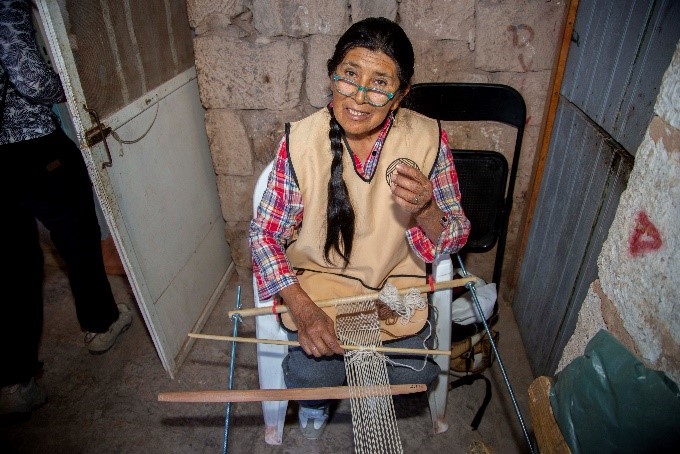 Casa Telar is a project promoted by the ONA Foundation and SQM, its objective is to recall textile art and the ancestral knowledge of the Lickanantay culture.
2019 was marked by important advances in the program, mainly in the work groups of the communities of Toconao, Socaire, Larache and Talabre, with the fundamental objective of enhancing the value of the Lickanantay Atacameño textile industry. Thus, for the first time, the Casa Telar Program participates in the twelfth edition of MasDeco Market, which brings together exhibitors and entrepreneurs of social innovation, design, cultural rescue and gastronomy, among other items.
The delegation made up of students - representatives of communities, had the opportunity to learn about work experiences and development of projects and ventures throughout Chile, and abroad. Show the work they carry out in this territory and collect technical opinions from experts and the public about the work they carry out, which undoubtedly strengthens their work.
Casa Telar is a project promoted by the ONA Foundation and SQM, its objective is to recall textile art and the ancestral knowledge of the Lickanantay culture.
2019 was marked by important advances in the program, mainly in the work groups of the communities of Toconao, Socaire, Larache and Talabre, with the fundamental objective of enhancing the value of the Lickanantay Atacameño textile industry. Thus, for the first time, the Casa Telar Program participates in the twelfth edition of MasDeco Market, which brings together exhibitors and entrepreneurs of social innovation, design, cultural rescue and gastronomy, among other items.
The delegation made up of students - representatives of communities, had the opportunity to learn about work experiences and development of projects and ventures throughout Chile, and abroad. Show the work they carry out in this territory and collect technical opinions from experts and the public about the work they carry out, which undoubtedly strengthens their work. EL PUERTO COWORK
 We teamed up with La Semilla Foundation in Tocopilla to promote entrepreneurship, partnerships, training and business development by supporting “Puerto Cowork,” a hub where local startups can meet up. For two straight years we focused on launching and consolidating projects but in 2019 we changed gears and began focusing on awarding other types of funding for startups, since the experience provided allowed them to take off and begin selling their products and services. This strategy achieved the following:
62 projects were awarded funds from Corfo, Sercotec and other private companies, raising a total ff $167 million in capital. Funds awarded:
Sercotec = 63 million awarded to 18 beneficiaries from “El Puerto Cowork” CORFO = 59 million awarded to two beneficiaries from “El Puerto Cowork” Minera El Abra Empréndete Start Up Fund = 5 million awarded to one beneficiary from “El Puerto Cowork” SQM Fund = 40 million awarded to 37 beneficiaries from “El Puerto Cowork”
We teamed up with La Semilla Foundation in Tocopilla to promote entrepreneurship, partnerships, training and business development by supporting “Puerto Cowork,” a hub where local startups can meet up. For two straight years we focused on launching and consolidating projects but in 2019 we changed gears and began focusing on awarding other types of funding for startups, since the experience provided allowed them to take off and begin selling their products and services. This strategy achieved the following:
62 projects were awarded funds from Corfo, Sercotec and other private companies, raising a total ff $167 million in capital. Funds awarded:
Sercotec = 63 million awarded to 18 beneficiaries from “El Puerto Cowork” CORFO = 59 million awarded to two beneficiaries from “El Puerto Cowork” Minera El Abra Empréndete Start Up Fund = 5 million awarded to one beneficiary from “El Puerto Cowork” SQM Fund = 40 million awarded to 37 beneficiaries from “El Puerto Cowork”
EXPANDING INCLUSIVENESS”
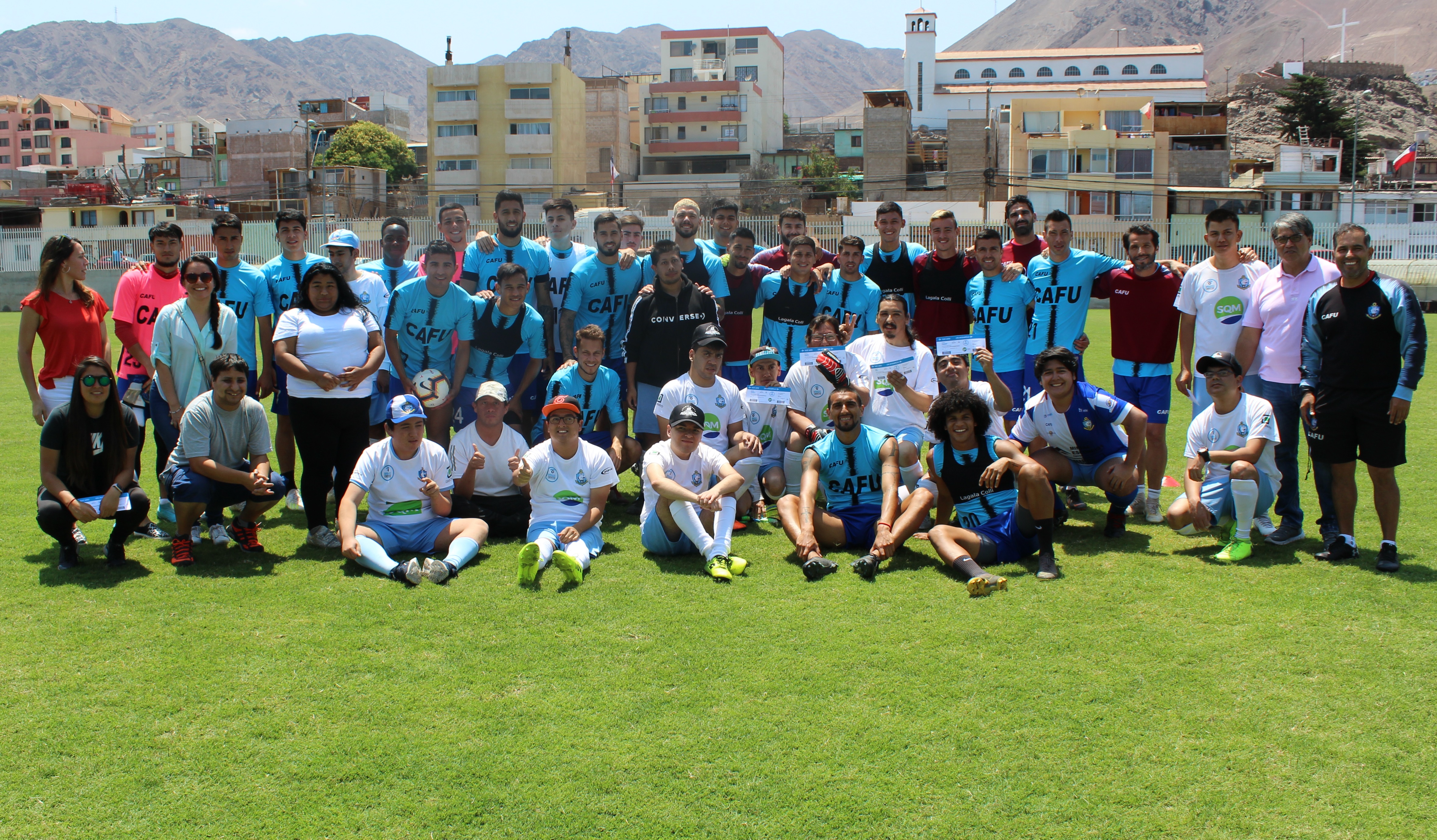 SQM volunteers have been supporting a beautiful inclusiveness project in conjunction with the Miradas Compartida Foundation that is devoted to social and workplace integration of persons with intellectual disabilities. This entails working closely with the inclusive soccer schools in the cities of Antofagasta, Tocopilla and Santiago and groups of employees from the Company who play with the young children on inclusive teams that compete on different occasions.
Additionally, in Antofagasta and Tocopilla the volunteers took part in inclusive theater classes as students alongside the children from Miradas Compartidas, as a way to experience inclusion. SQM support also included contributions for other inclusive activities carried out by the foundation in the cities where it works such as paraolympic games.
SQM volunteers have been supporting a beautiful inclusiveness project in conjunction with the Miradas Compartida Foundation that is devoted to social and workplace integration of persons with intellectual disabilities. This entails working closely with the inclusive soccer schools in the cities of Antofagasta, Tocopilla and Santiago and groups of employees from the Company who play with the young children on inclusive teams that compete on different occasions.
Additionally, in Antofagasta and Tocopilla the volunteers took part in inclusive theater classes as students alongside the children from Miradas Compartidas, as a way to experience inclusion. SQM support also included contributions for other inclusive activities carried out by the foundation in the cities where it works such as paraolympic games.
DRIVING ROBOTICS AND SCIENCE WITH ViLTI SeMANN
 SQM is a supporter of the ViLTI SeMANN Program. Managed by Universidad Católica del Norte (UCN) in Tocopilla and in its fourth year, this program is designed to boost primary education among boys and girls ages 4 to 9.
In 2019, a total of 80 students from seven education establishments in Tocopilla participated in this program. Its objectives are to: close educational gaps, promote creative talent and contribute to equal opportunities in education (knowledge). Bringing science and robotics closer to the students through fun and engaging learning techniques.
The most noteworthy achievements this year included sending three students from Tocopilla schools to the National Robotics Tournament held in Santiago, where they got to not only experience the trip itself but also spend time with boys and girls from other regions.
Also, for the first time this year, the ViLTI SeMANN Program was held in María Elena, benefiting 20 boys and girls ages 5 to 7 years form the Arturo Pérez Canto School. Similar to their peers in Tocopilla, these children had the opportunity to develop their critical thinking skills through games, singing and dancing, all related to the world of robotics.
SQM is a supporter of the ViLTI SeMANN Program. Managed by Universidad Católica del Norte (UCN) in Tocopilla and in its fourth year, this program is designed to boost primary education among boys and girls ages 4 to 9.
In 2019, a total of 80 students from seven education establishments in Tocopilla participated in this program. Its objectives are to: close educational gaps, promote creative talent and contribute to equal opportunities in education (knowledge). Bringing science and robotics closer to the students through fun and engaging learning techniques.
The most noteworthy achievements this year included sending three students from Tocopilla schools to the National Robotics Tournament held in Santiago, where they got to not only experience the trip itself but also spend time with boys and girls from other regions.
Also, for the first time this year, the ViLTI SeMANN Program was held in María Elena, benefiting 20 boys and girls ages 5 to 7 years form the Arturo Pérez Canto School. Similar to their peers in Tocopilla, these children had the opportunity to develop their critical thinking skills through games, singing and dancing, all related to the world of robotics.
ENVIRONMENTAL AGENTS OF CHANGE IN TOCOPILLA
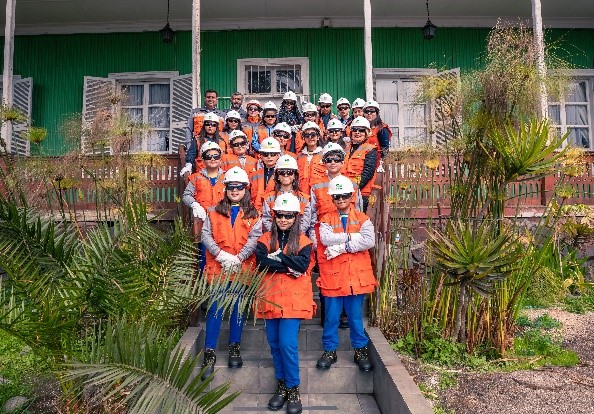 For four years, SQM has provided support for environmental education activities that emphasize teaching students how to care for and appreciate the environment and water resources, create more parks and green areas, and learn about gardening/farming, etc. One of these programs is the Tocopilla Environmental Agents of Change Network whose 40 student members are agents of change from 12 education establishments.
In 2019 each member establishment received a kit containing a planting table, seeds and a garden that they could use to teach others about hydroponic growing techniques.
Implemented by Verdical and funded by SQM, the program has successfully created a hanging garden at the Arturo Prat school, thereby adding 10m2 of green areas that are home to nearly 500 plants. The children also participated in theoretical and practical workshops. Moreover, the Tocopilla Municipal Education Administration Department is also a member of this public private partnership that was set up to foster sustainable development in Tocopilla.
For four years, SQM has provided support for environmental education activities that emphasize teaching students how to care for and appreciate the environment and water resources, create more parks and green areas, and learn about gardening/farming, etc. One of these programs is the Tocopilla Environmental Agents of Change Network whose 40 student members are agents of change from 12 education establishments.
In 2019 each member establishment received a kit containing a planting table, seeds and a garden that they could use to teach others about hydroponic growing techniques.
Implemented by Verdical and funded by SQM, the program has successfully created a hanging garden at the Arturo Prat school, thereby adding 10m2 of green areas that are home to nearly 500 plants. The children also participated in theoretical and practical workshops. Moreover, the Tocopilla Municipal Education Administration Department is also a member of this public private partnership that was set up to foster sustainable development in Tocopilla.
FLOWER WORKSHOPS
 The making of tin and paper flower crowns is a tradition that dates back to the splendor of saltpeter. Families took root in this Pampa tradition to worship their loved ones who participated, funeral art compatible with the extreme climate of the pampa and that filled with color the cemeteries of the former nitrate offices in northern Chile.
To continue rescuing and valuing this Pampa tradition, the workshop that SQM has been promoting for 8 years culminates with a pilgrimage to different nitrate cemeteries in the Antofagasta and Tarapacá regions for the day of all saints, a journey that the students of the Workshop with a bronze band to take their art to the cemeteries that lie in the vastness of the calichera pampa. Additionally in 2019 in Iquique the paper flowers were rescued.
The making of tin and paper flower crowns is a tradition that dates back to the splendor of saltpeter. Families took root in this Pampa tradition to worship their loved ones who participated, funeral art compatible with the extreme climate of the pampa and that filled with color the cemeteries of the former nitrate offices in northern Chile.
To continue rescuing and valuing this Pampa tradition, the workshop that SQM has been promoting for 8 years culminates with a pilgrimage to different nitrate cemeteries in the Antofagasta and Tarapacá regions for the day of all saints, a journey that the students of the Workshop with a bronze band to take their art to the cemeteries that lie in the vastness of the calichera pampa. Additionally in 2019 in Iquique the paper flowers were rescued. 